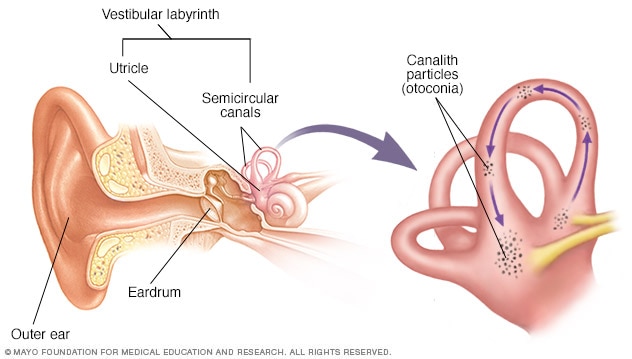The complex link between inner ear health and vertigo highlights the significant influence of the middle ear’s complex systems on our body’s balance. The feeling of spinning or dizziness associated with vertigo is frequently caused by interference with the sensitive balancing mechanism in the inner ear. The vestibular system, a part of the inner ear, also controls our perceptions of balance with spatial orientation. Vertigo may result from problems with this system brought on by infections, trauma, or underlying medical diseases. ent doctors in Dubai help patients by Understanding the relationship between inner ear health and vertigo, helping to clarify the intricacies of our body’s balance perception and emphasising how important it is to keep the inner ear healthy and functioning for general stability and well-being.
Principles Of Equilibrium And Inner Ear The Anatomy
Operation Of Vestibular System:
The body’s delicate balance control centre is the vestibular system, a sophisticated network located within the inner ear. This system, which consists of the vestibular nerve, utricle and saccule, and semicircular canals, detects and interprets head motions and modifications in body posture. The otolithic organs sense linear motion and gravitational forces, whereas the semicircular canals, arranged in various planes, detect rotating motions. These structures’ fluid changes in response to head movement, bending microscopic hair-like cells that transmit signals to the brain that provide information about direction and movement in space. The brain uses this complex feedback system to maintain balance, regulate posture, and synchronise eye movements, which allows us to move around and carry out daily tasks with steadiness and accuracy.
Semicircular Canals Regarding Sensation Of Balance:
How the inner ear’s semicircular canals work and how one feels balance is closely related. All three fluid-filled canals, arranged in various planes, are essential parts of the vestibular system, which detects head rotations. The brain can detect modifications to angular velocity and direction because each canal perceives movement in one of three horizontal, vertical, or diagonal planes. These canals’ fluid changes in response to head movement, which activates hair cells—specialised sensory cells. By detecting movement and communicating with the brain, these hair cells help to maintain equilibrium and spatial orientation by giving crucial data on the body’s rotational motion.
Disorientation And Its Processes
Description And Types Of Vertigo:
Dizziness or a spinning feeling that can be frightening and confusing is known as vertigo. It is frequently caused by problems with the body’s equilibrium system. Peripheral and central vertigo are the two main varieties. More prevalent and frequently associated with problems in the inner ear, peripheral vertigo is caused by diseases such as vestibular neuritis, Meniere’s disease, and benign paroxysms of positional vertigo (BPPV). Head motions can cause short bouts of acute vertigo caused by misplaced inner ear crystals in BPPV. Fluid accumulation in the inner ear is the cause of Meniere’s disease, which causes abrupt vertigo, loss of hearing and ringing in the ears. Severe vertigo that lasts for days or weeks is the consequence of vestibular neuritis, a swelling of the vestibular nerve. Problems in the brain are less frequent but more deadly than peripheral vertigo and central vertigo. Patients with vertigo are treated well in the best hospitals in Dubai.
Inner Ear Infections’ Role:
The sensitive structures and operations of the inner ear can be severely impacted by inner ear infections, which can cause various imbalances and equilibrium problems. These infections, frequently brought on by bacteria or viruses, can impact the vestibular system or the inner ear cochlea, producing symptoms including vertigo, nausea, and dizziness. Inner ear infections can result in conditions such as vestibular neuritis or labyrinthitis, which inflame the nerve that supplies the vestibular system or the labyrinth, causing extreme dizziness and problems with balance. Furthermore, infections can damage the complex sensory cells that provide messages to the brain about movement and position of the body, making it more difficult for the brain to understand information linked to balance appropriately.
Methods Of Treatment
Modifications To Lifestyle:
Modifying lifestyle habits is pivotal in managing vertigo and promoting inner ear health. Individuals experiencing vertigo episodes often benefit from adjustments that reduce triggers or exacerbating factors. Simple changes like being mindful of body movements, especially sudden head turns or changes in position, can help alleviate symptoms of certain types of vertigo, such as benign paroxysmal positional vertigo (BPPV). Regular physical activities that don’t exacerbate vertigo, such as gentle exercises or balance training, can strengthen the body’s proprioception and improve stability. Dietary adjustments, such as reducing salt intake in cases of Meniere’s disease, may also help manage symptoms. Adequate hydration, stress reduction techniques, and sufficient restful sleep contribute to overall well-being and positively impact inner ear health. However, lifestyle modifications should be tailored to the specific type of vertigo and individual needs, often in consultation with healthcare professionals of best ent specialist dubai to ensure effectiveness and safety in managing symptoms and supporting inner ear health.
Inner Ear Health’s Effect On Everyday Life:
The state of one’s inner ears greatly impacts daily living and affects many different parts of one’s routine. A healthy inner ear is essential to preserve balance, spatial direction, and general stability throughout daily activities. Simple actions like walking, driving, or standing can become difficult and scary when inner ear health is affected, as shown in disorders like vertigo or inner ear infections. A person’s movement may be restricted due to unpredictable vertigo episodes, making working, travelling, or engaging in social activities difficult. As a result, their entire quality of life may be negatively impacted. Inner ear problems can also worsen mental and emotional health by causing emotional tension, worry, and a feeling of losing control over one’s own body.










